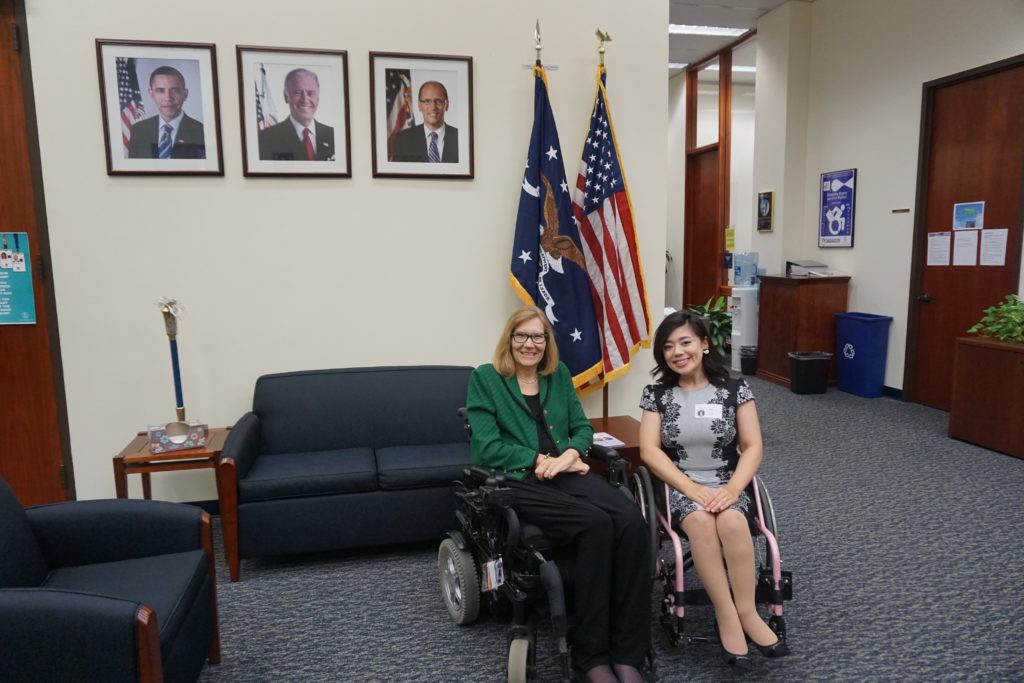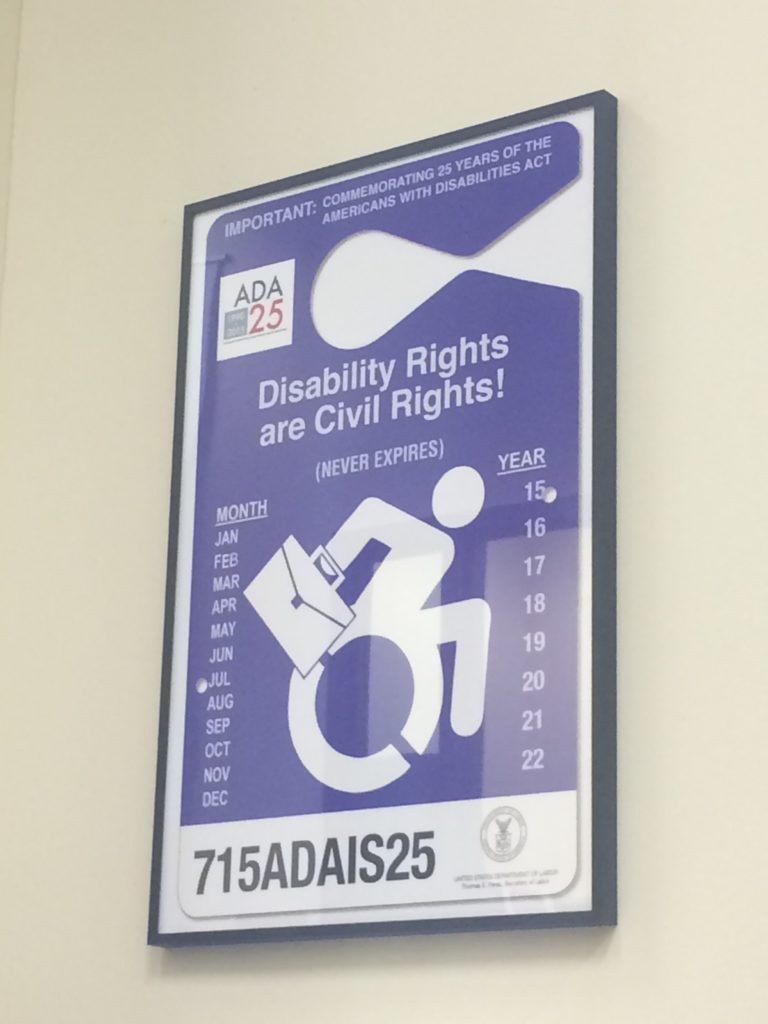この記事は次の言語でも読めます:日本語
The Office of Disability Employment Policy (ODEP) in the U.S. Department of Labor is working to develop and influence policies and practices that increase the number and quality of employment opportunities for people with disabilities. I had the opportunity to interview three people at ODEP. The first person I would like to write about is Jennifer Sheehy, Deputy Assistant Secretary.

Jennifer Sheehy was originally working for Marriott International in charge of food and beverage marketing for a hotel. While she attended business school, she had a spinal cord injury and became a wheelchair user. Because of the dramatic life change, she became interested in the employment of people with disabilities. Over 20 years, she has worked with national disability organizations and governmental offices including the White House working to promote disability employment.
Jennifer Sheehy talked to me about the importance of promoting the value of hiring and promoting employees with disabilities among employers in the US. Strict laws and regulations that prevent disability employment discrimination are sometimes not enough to advance hiring of people with disabilities, if employers have preconceived notions about people with disabilities. Another issue she mentioned was accessibility of programs in the workplace. All training programs need to be accessible to all employees, including people with disabilities. As with access to education, it is very important for people with disabilities to be a part of the mainstream. In this way, people with disabilities can learn and develop skills and receive the same opportunity to be promoted and expand their job capacity as people without disabilities.
We have similar issues in Japan. Still many employers feel that people with disabilities have low working performance potential and limit job opportunities available to them. Moreover, due to lack of accessibility and accommodations in the workplace, some employees with disabilities cannot take internal trainings and cannot get promoted even after working with the company for a long time. If they want to change a job, they need to start from an entry level position, because they don’t have enough skills and experience compared to people without disabilities in the same field. Employment of people with disabilities is not ended when employers hire a minimum percentage to meet a quota (*1). Employers should screen abilities and potentials of people with disabilities and provide opportunities where they can develop skills and experiences. By doing so, employers will benefit from the many rewards of job performance and diverse perspectives of employees with disabilities.

To create an inclusive working environment, Jennifer Sheehy said,
“It is very important that senior executives show their understanding toward people with disabilities and raise awareness of diversity as a corporate culture. If leaders personally have a disability, sharing their own stories can be very powerful toward creating an inclusive culture in the company. Also there should be well developed policies in the hiring process, providing accommodations, forming employee disability groups (*2), ensuring accessibility of the company’s official website, and company benefits for employees. ”
When I heard about this, I remembered Fast Retailing, a company who owns UNIQLO, which is the biggest fashion retail company in Japan. Before I came to the US for research, I was working in the same industry in Tokyo. Through my work, I sometimes visited other companies, including Fast Retailing. In the retail industry, the majority of employees work at stores, and many employers think that it is hard to hire people with disabilities and have them work at the retail shops. In Japan, it’s still rare for people with disabilities to work in direct customer service positions or in a backroom of a store, since they are often crowded with products, and employees need to work quickly within the limited space. Since people have an image that people with disabilities need more support and accommodation while working, many employers try not to hire people with disabilities at a store. However, Fast Retailing CEO and President Yanai began a disability hiring project in 2001 and instructed employees to hire at least one person with a disability for each store. Right now over 90% of stores have completed the hiring, and when I interviewed Fast Retailing 2 years ago I learned that one employee with disabilities is working as a store manager too. Fast Retailing is doing successful business not only in Japan but also in other countries. By making a diverse working environment, the company could produce products and service that are loved by diverse customers in many countries.

Lastly, Jennifer Sheehy introduced “National Disability Employment Awareness Month,” which is celebrated every October in the US and began in 1945. This year, companies use the theme “#InclusionWorks” and share what they do for employment of people with disabilities on SNS. ODEP also uploaded on their website materials including a poster that companies can download and put their logo on to use in their organization or externally. In Japan, it seems every September is an awareness month of employment for people with disabilities. To make people pay more attention to the issues of employment for people with disabilities, using SNS like ODEP does would be very effective.
In the ending, I will share a clip that Time Warner, an Internet cable company, created for National Disability Employment Awareness Month.
*1 Japan uses quota system for employment of people with disabilities. Companies with more than 50 employees have to hire people with disabilities at least 2%.
*2 In the US, especially big companies have “Employment Resource Group=ERG” to raise awareness diversity. Cisco, Starbucks, Microsoft where I have visited for my research also have ERG of people with disabilities. You can read the interview articles below.
